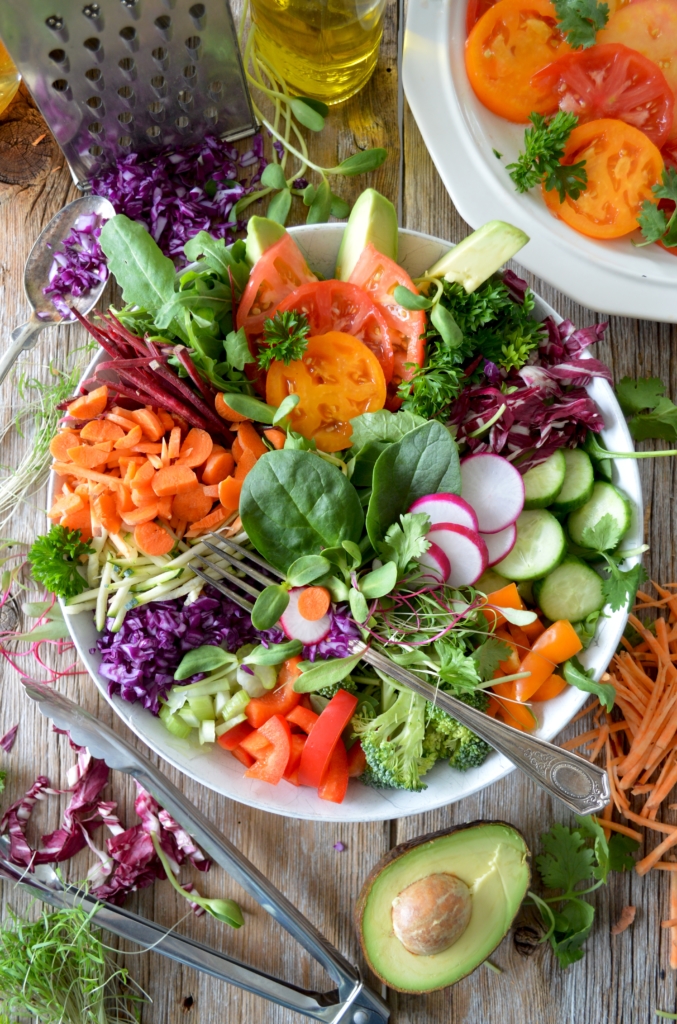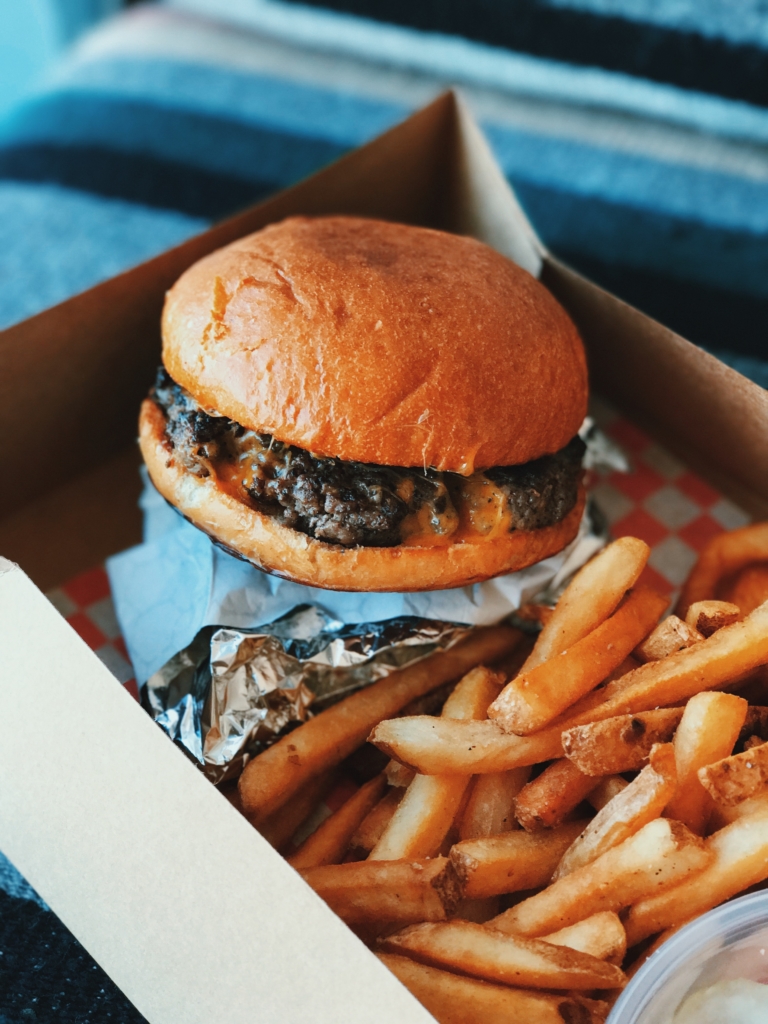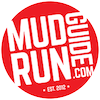 Let me know if any of this sounds familiar: I run obstacle course races, I eat a salad a few times a week, I shouldn’t have any nutrition problems that cause health issues right? I should just have to worry about my nutrition a few days before race day and make sure I’m eating the right things then…right?
Let me know if any of this sounds familiar: I run obstacle course races, I eat a salad a few times a week, I shouldn’t have any nutrition problems that cause health issues right? I should just have to worry about my nutrition a few days before race day and make sure I’m eating the right things then…right?
Wrong.
Thanks to training for OCR, I lost 20 pounds from 215 to 195 when I first got into the sport in 2013. I knew I was still a little bit overweight, but I didn’t think it was that bad.
Then I started to have health issues like gout, frequent heartburn and asthma attacks that I couldn’t control. I kinda lived with it and had mediocre OCR results. Then at the beginning of this year, I found out my cholesterol levels are verging on high.
I didn’t need any more motivation. I started looking for ways to best fuel my body for training, for races and life in general.
So far it’s been a better year nutrition-wise, I started it off by losing another 20 unneeded pounds and it looks like my cholesterol scores are going in the right direction. It’s led to better results on the race course and I feel lighter and better in general, but I still feel like I don’t have any actual nutritional direction.
A big reason for that lack of direction is the overwhelming amount of information that can be found about sports nutrition. Information that is often contradictory. I found lots of information out there about what to eat, diets to follow, etc. However, most of that information wasn’t designed with OCR athletes in mind. That’s when I decided to seek out two OCR experts that I hoped could give direction to me and you.
Those two experts are Melissa Boufounos, a Certified Holistic Nutritionist and Precision Nutrition Level 1 Coach who helps OCR athletes and Yancy Culp, veteran OCR coach and husband to Amy Culp, Sports Dietitian at The University of Texas.
Yancy was quick to point out that one of the biggest problems for OCR athletes right now is that just about everyone considers themselves an advice giver, and the problem is that advice isn’t always backed by science. There’s 1000’s of different opinions, trends (and fads), but very few people are seeking the advice of professionals.
Melissa had a similar thought: “People are getting advice from the wrong places. What will work for a CrossFit athlete, could be different than an OCR athlete.”
Don’t Follow The Trends
So what is good advice for an OCR Athlete that wants to improve their nutrition? First of all, stay away from the trends, fads and magic pills. Both Melissa and Yancy agreed on this.
“I might piss some people with this,” Yancy said, “but mark my words, give it one or two years and people will be saying Keto…what?”
“There are people making millions, maybe even billions off of the keto diet and there are millions of dollars that have been made off of the millions of diets that come and go.”
“There’s nothing sexy about a one page book, about what I just said or that my wife would say. There is some detailed stuff, but 90% of what you need to know could fit into a one page book.”
“It varies from person to person,” Melissa said, “but most OCR athletes should eat at least 50% of their diet from carbohydrates. Athletes in general should be eating 20-25% healthy fats. Protein fills the gap. If you’re not getting enough, different problems will arise.”
Yancy’s advice is that “your body always comes back to what you need. Your body will take care of you, if you listen to it” and to pay attention to what clinical studies say.
The Bigger Picture
My initial questions to both Melissa and Yancy were about what to eat leading up to race day. However, both were quick to point out that it’s the bigger picture, not what you food you put into your mouth a few days before a race that makes the difference. Everyday nutrition actually matters more than what you eat or drink before, during, or after a race.
Melissa summed it up:
“As an athlete, what matters is supporting your every day training, if you’re not eating the right things and getting the right nutrients to support their training, you’re not going to recover. You’re not going to be adapting and getting better. So once you get to the race day, it isn’t going to matter because you’re not getting the full benefits of your training.”
“If you’re not paying attention on a normal basis, never drinking water, than drinking liters and liters of water before a race, or eating take out food all the time, then right before a race eating rice and chicken won’t change your race results.”
Plus, “It’s not just nutrition, but lifestyle factors that affect people’s lives that will give them the competitive edge.”
This was so important to Melissa that she created an online program, The OCR Personal Best Performance Program, and she says the program is for obstacle course race athletes who want the competitive edge to consistently achieve their personal best performance.
It’s a program that’s three months long, that works to slowly change habits and create new lifestyle habits.
It includes a week on carbohydrates, what are the smarter carbohydrates and what time of day is better for certain carbs or what types are better for certain parts of the race season. It covers a lot of factors that I’ve never taken into consideration before.
Other focuses of her program include fats, hydration, sleep, and recovery. So in other words, if you think you can wait until race week to properly prepare your body for a race, you’re wrong.
This made a lot of sense to me when I stepped back and stopped trying to find a magic bullet for a perfect race day. As I’ve lost weight and become healthier overall, it wasn’t because of one magic food. It’s because of the healthier choices that were part of a healthier lifestyle. For me, that, included whole foods, ingredient lists that I could understand and less processed food.
Common Myths
I asked Melissa about common misconceptions that she comes across in her work. She had two that stood out.
The first is that some elite athletes think they need so many calories that you can’t get enough from healthy foods. Therefore they think it’s okay to eat junk foods to get enough calories. Worrying about performance only, not overall health. She said, that’s the wrong mentality and it’ll lead to health and performance issues. It’s not one or the other.
The other misconception she sees is that a lot of competitive and weekend warriors overestimate how much they’re exercising and underestimate how much they’re eating. So then they end up in a calorie surplus. Which leads to be people trying fad diets. Don’t realize they’re in a calorie surplus, so they blame the foods, not their own misjudgment of food and how much they’re eating.
Those both sound familiar to me, the second one made me really take a step back and look at how I’m eating and counting calories. Something is working most of the time because I have lost weight, but when I hit a plateau is when I tend to not blame the quality of the foods and definitely not my bad judgment of the quantity of what I was eating. It gave me a lot to think about.
Don’t Have To Be Perfect All Of The Time
Yancy and his wife are big believers that you don’t have to be perfect in their diet.
“Have to fuel with great athletic purpose 80-90% of the time.” He said. “Go out for a pizza or a beer, not a cheat day, allowed to have fun foods. Just like with training really want to be consistent most of the time. Will have much greater success. Don’t try to beat yourself to have the perfect nutrition profile, the training profile.”
“It’s not all about being perfect,” Yancy said. “Have a great balance. “Fuel to win most of the time.”
I can’t tell you how much this rang true for me. I’ll have stretches, sometimes weeks, where my nutrition, hydration, and sleep is spot on. Then a dinner out with the family becomes a cheat meal and because I feel like I cheated once, I get depressed and my diet becomes filled with comfort and junk foods. It’s hard to keep on track every single day with every single meal and I think that’s been a big issue for me. Having a balance seems a lot more realistic because having a fun meal with my family shouldn’t be something that makes me feel guilty.
Closing
Learn more about Melissa and her program, The OCR Personal Best Performance Program at her website. It’s 12 lessons over 12 weeks, witch each week a new healthy habit.
Also, Melissa has more resources on her website: OCR Macro Guide, a fuel list with mostly whole-food based, and how to fuel for OCR
Yancy suggested OCR athletes having a check-in with a professional every six months. Either a sports nutritionist or sports performance dietitian. He said it’s just as important as going to a running mechanics coach to make sure your mechanics are sounds.
Disclaimer: The viewpoints expressed by the authors do not necessarily reflect the opinions, viewpoints and official policies of Mud Run Guide LLC, or their staff. The comments posted on this Website are solely the opinions of the posters.


Leave A Comment